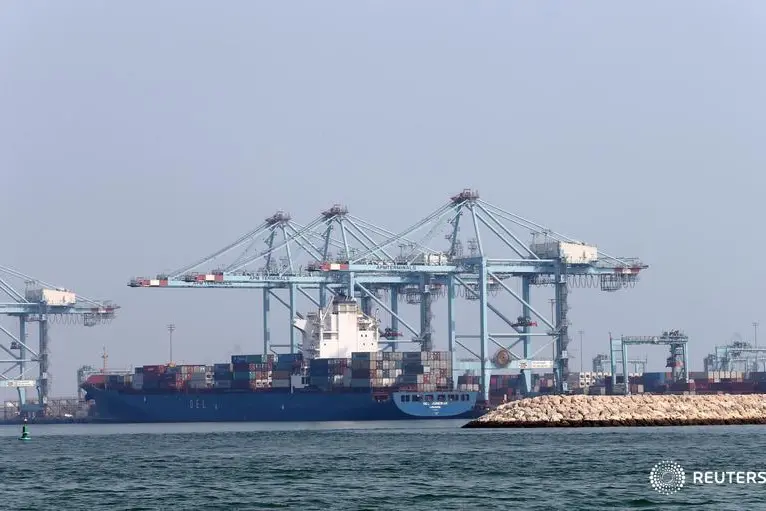PHOTO
MANAMA: A platform that enables businesses to digitally connect, share information and collaborate across the shipping supply chain will soon be fully operational in Bahrain.
APM Terminals Bahrain (APMT) chief executive and managing director Susan Hunter told the GDN in an exclusive interview that the operator of the Khalifa Bin Salman Port (KBSP) has already integrated with the platform known as TradeLens.
Developed by Maersk and IBM and underpinned by blockchain technology, the TradeLens ecosystem comprises over 100 diverse organisations including carriers, ports, terminal operators, third-party logistics providers and freight forwarders.
It also includes shippers from around the world. Together, participants publish and subscribe to data under a shipper determined digital permissioning model.
Ms Hunter said in keeping up with the technological advancements in the logistics and supply chain, APM Terminals Bahrain has been working closely with TradeLens since 2018 and “is currently transmitting data on a trial basis”.
“However, we are awaiting the integration with Customs before the trade can benefit. This is expected to happen in the near future.”
KBSP is a multipurpose facility for domestic cargo, cruise traffic and a trans-shipment hub for the growing Gulf shipping market.
APMT handles all containerised cargo to and from Bahrain in addition to general cargo.
The operator has been working closely with the Economic Development Board, Customs Authorities and Ports and Maritime Affairs and potential customers to make the blockchain technology available to the trade in Bahrain, she added.
The attributes of blockchain technology are ideally suited for large networks of disparate partners.
Blockchain establishes a shared, immutable record of all the transactions that take place within a network and enables permissioned parties access to secured data in real time.
Ms Hunter said, “Many of the processes for transporting and trading goods are costly, in part, due to manual and paper-based systems. Replacing these peer-to-peer and often unreliable information exchanges, the platform enables participants to digitally connect, share information and collaborate across the shipping supply chain ecosystem.”
According to her, TradeLens gives users a comprehensive view of their data, allowing them to collaborate as cargo moves around the world, helping create a transparent, secured, immutable record of transactions.
As the first woman chief executive of a port operator in Bahrain and the region, Ms Hunter says her first big challenge since taking the helm this February was to keep the momentum going.
“As Bahrain’s only commercial port, Khalifa Bin Salman Port is a highly valued national and regional infrastructure asset and has experienced impressive and sustained growth over recent years. I came on board soon after the company’s successful IPO on the Bahrain Bourse, which was oversubscribed by 5.4 times.”
She had to quickly understand the dynamics of Bahrain’s economy, the business, culture and Economic Vision 2030, and how the port fits into that.
“My short-term strategy for the first six months was to make sure we have a good first year after IPO, in terms of our quarterly results, and become really responsible to the shareholders and the economy here.”
Ms Hunter has achieved that goal as the operator’s share price closed at BD1.3 on the last trading day (December 8) nearly double of the IPO price of 660 fils exactly a year ago.
She feels completely at home in Bahrain and one of the first things she quickly discovered was the “huge amount of openness and willingness among Bahrainis and a drive and a passion to do more.”
“Bahraini women have assumed leading positions in various fields of work and responsibilities, including high holding high diplomatic and decision-making posts and therefore it was much of an adjustment for the people I had to work with.”
The official said she is also excited about the 10th anniversary of KBSP being celebrated today.
According to Ms Hunter, the port’s future plans include making processes more streamlined and transparent, which will help the operator (APMT) to plan better and in turn improve efficiency.
“We need to understand where we put our future investments and our energy to focus on current and evolving customer needs like e-commerce, how do we keep that agility, how do we speed up turnaround times, what would the distribution centre look like, is it better inside the terminal or in the logistics zone, it has to be a customer-driven.”
She is also upbeat about the opportunities unlocked by infrastructure projects – the new passenger terminal at Bahrain International Airport and the new causeway to Saudi Arabia and others.
A firm supporter of the ease of doing business, which the Bahrain government has been driving as a key differentiator, the official feel the port has a key role to play in that ecosystem as well as the logistics hub strategy.
“We have introduced a new terminal operating system, which does a lot of things, like helping us with efficiency, and we will make sure that we have the core systems and infrastructure in place.”
The port has to play the role of an enabler or facilitator for industry and trade, which is what she and her team is striving for, said Ms Hunter.
avinash@gdn.com.bh
© Copyright 2019 www.gdnonline.com
Copyright 2019 Al Hilal Publishing and Marketing Group Provided by SyndiGate Media Inc. (Syndigate.info).





















